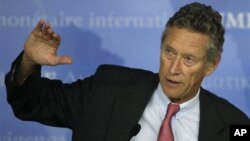The International Monetary Fund says emerging nations are leading the recovery from the global financial crisis, while wealthy nations lag behind. The IMF chief economist said some emerging nations need more market-oriented currency policies, while wealthy nations need to cut budget deficits.
International Monetary Fund officials say the world economy will expand 4.8 percent this year and slow down a bit next year. Emerging nation economies will expand a bit more than seven percent this year, while developed nations can expect to grow just 2.7 percent.
Although the global recovery is uneven and fragile, IMF chief economist Olivier Blanchard says the world is not likely to lapse back into recession. But he urged policy-makers in advanced and emerging nations to take tough actions.
Market-oriented currency policies
Blanchard told emerging nations with large trade surpluses that it will help their economies to change policies that rely heavily on exports, and do more to boost domestic demand.
China is one such nation, and allowing a more market-oriented exchange rate for China's currency could boost domestic demand by making imported goods more affordable to Chinese consumers.
Blanchard said current policies distort economic forces and hurt the quality of life in the country. "We see distortions, which led to too low a level of consumption, or too low a level of investment, and are decreasing welfare. Removing these distortions, and thus allowing investment to increase is highly desirable from the point of view of the country," he said.
Budget deficits
Blanchard also had a stern message for wealthy developed nations, saying they must do more to cut budget deficits. Worries about whether or not governments in Greece and other European nations can repay their debts have worried lenders and investors.
Those budget deficits grow in part from efforts to stimulate the economy and recover from the deep recession. Blanchard said it is not yet time to stop supporting the economy, but it is necessary for governments to show that they have a clear path out of debt.
"What is essential here is not so much to phase out fiscal stimulus now, but to offer a credible, medium-term plan for debt stabilization and eventually, debt reduction," said the economist.
Blanchard also urged faster and stronger action to reform the financial system.
Severe problems in banks and other major financial firms were a major reason for the financial crisis. Reform efforts include proposals to make banks keep larger reserves, and finding orderly ways to cope with the failure of financial firms that are so large their failure could hurt the entire economy.
See related report by Mil Arcega:




